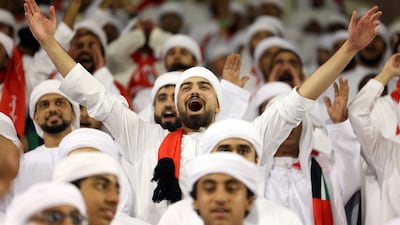UAE football fans have been frustrated by the ticket allocation for the vital World Cup qualifier against Qatar, after their section of the ground sold out in five minutes.
The national team will face the hosts of the three-team qualifier play-off on Tuesday night, knowing that a draw or a win would see them clinch a place at next summer’s World Cup.
Emirati supporters have travelled to Qatar’s capital in vast numbers. Ahead of the opening match against Oman on Saturday, they swamped Souk Wafiq in central Doha, lighting flares, waving flags and singing songs in support of the side.
They had 5,000 tickets for that match, which could have sold multiple times over, and the majority of those ticket-holders were in their seats two hours before the match kicked off.
And yet, despite the frenzy, they have been granted just eight per cent of all tickets – for the all-important second game against the hosts.
The match is being played at the 15,000-capacity Jassim Bin Hamad Stadium in the Al Sadd area of Doha. It was not one of the stadiums that was used when Qatar hosted the last World Cup, all of which have vastly greater capacities than Al Sadd’s home ground.
Predictably, all tickets were snapped up as soon as they were made available, leaving thousands of Emiratis ticketless in Doha.
On Sunday afternoon, the UAE Football Association had issued instructions for fans about how to secure admission to the game.

















This included making alternative arrangements for those who miss out to view the game together on big screens in Doha.
The FA praised fans for “their positive role in motivating the players before, during, and after the [Oman] match, whether in the stands, behind the screens, or on social media platforms”.
It also said it “affirms its commitment to providing every comfort to Emirati fans supporting the national team in Doha”. That included inviting supporters to attend broadcasts of the game at the Sheraton Hotel in Doha, and at the Radisson Blu.
It also said the FA “has provided cheering equipment” for the supporters at the match.
The scenes in Doha have not gone unnoticed by the players. Some of them took to social media ahead of Saturday’s game and reposted pictures of the fans in Souk Waqif.
Khalid Essa, the captain, even went to speak directly to the capo – the leader of the main body of supporters – on the sidelines after the thrilling 2-1 comeback win against Oman.
Caio Canedo, who was one of the half-time substitutes who helped spark that turnaround against Oman, said the players feel the support of the fans, no matter how many are inside the stadium.
“We just have to keep focused and play our football,” Canedo said.
“We know there will be more Qatari fans because they have the [larger] percentage of tickets. But don’t get us wrong: [whatever] the number of tickets that they have, the UAE fans will make a lot of noise.
“For everything they do for us, we just want to give back. Our goal is to give back the qualification to the UAE nation.
“They will support us and we just have to keep playing football. We know we have the advantage of the draw [being enough to qualify] but we want to play to win.”
Nicolas Gimenez, the UAE midfielder, said the players are trying their best to pay back the fans.
“We have a lot of motivation because of them,” Gimenez said. “They are here to support us and we are here to show the country how we want to go to the World Cup.
“We need to continue in this way, and to the supporters, we need to say thank you to them.”
Cosmin Olaroiu, the UAE coach, has pointedly attempted to steer clear of any criticism of the organisation of the play-off.
His reasoning is that they cannot affect it now, so he does not want negative energy bleeding into his task of preparing the players for their attempt to win matches.
Carlos Queiroz, the coach of the third side in it – Oman – did point out the unfairness of the arrangements. Qatar were granted hosting rights for the tournament, then permitted to have the majority ticket share for each of their matches.
The host team also benefit from having a six-day gap between their two matches, while UAE and Oman have just three.
In the UAE’s case, the game against Qatar will kick off 15 minutes short of 72 hours after they started playing against Oman.
Olaroiu did acknowledge that the gap between games is unsatisfactory.
“For me, the best way to deal with this competition was to have four days between the games,” Olaroiu said.
“I think four days would be enough for the players to recover. We are playing for qualification and we are playing for the country.
“Anyway, now we are here. We have to recover, we have to get the spirit back, and see how we can manage the situation.”



